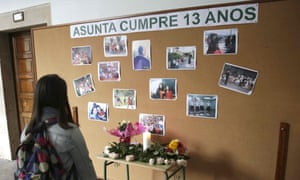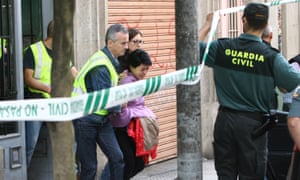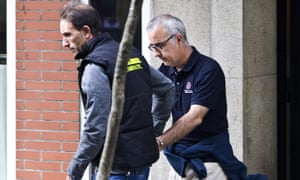
Asunta Fong Yang was adopted as a baby by a wealthy Spanish couple. Aged 12, she was found dead beside a country road. Not long after, her mother and father were arrested
One day in late June 2001, Rosario Porto, a petite, dark-haired lawyer from Santiago de Compostela, northern Spain, sat nervously on a flight to China beside her husband Alfonso Basterra, a quiet man from the Basque country, who worked as a freelance journalist. The couple, both in their mid-30s, were on their way to adopt a baby girl. Porto swallowed two tablets of Orfidal – a common anti-anxiety medicine that she had used before then – but remained too agitated and excited to sleep.
The couple had had no trouble persuading local Spanish authorities that they would make good parents and that their child would be surrounded by a loving extended family. Porto’s father was a lawyer who had been honorary consul for France in Santiago, and her mother was a university lecturer in history of art. They had given their daughter a flat that occupied a whole floor of a four-storey block in what some call Santiago’s “VIP zone”, home to the city’s upper middle class. The flat was decorated in the bold tones – blues, greens and yellows – that Porto liked, and full of art, curiosities and colourful rugs from around the world. The child’s bedroom would have wallpaper covered in clouds and suns.
At that time, adopting from China was unusual. Nobody in Santiago, a solidly bourgeois city of 93,000 people, had done so before, and only a few Chinese children had been adopted in the wider region of Galicia, a mostly rural area of 2.7 million people. But Spanish parents wanting to adopt were beginning to cast a wide net. With a plummeting birth rate and strict adoption laws, there were relatively few Spanish children needing homes, while adopting abroad was relatively quick and easy – at least for couples who could afford the costs of €10,000 or more. By 2004, Spain would rank second in the world for foreign adoptions – behind only the United States. The following year, adoptions of Chinese children peaked at 2,750. Of these children, 95% were girls (the one-child policy placed an added premium on boys).
Adopting a baby girl from abroad brought the satisfaction and, for some, the moral cachet of rescuing a child in need. In the progressive, cultured environment in which the Basterra Porto family moved, they could expect nothing but praise. Porto, who inherited her father’s role as honorary consul, even appeared on local television to share her wisdom and experience about adopting.

Psychologists’ reports painted a positive picture of the couple. Porto was “friendly, relaxed, emotionally expressive, cooperative, adaptable and solicitous,” they said. “I am a passionate woman,” she told them, describing her husband as “patient, easy-going, understanding and with a sense of humour, a strong character who makes his own decisions.” The Porto family, one of their friends told me, were “aristocracy”.
In China, an underweight, undersized nine-month-old baby girl from Hunan province called Asunta Fong Yang awaited them. It was, Basterra would recall, “an incredible trip”. Two weeks later, after navigating the Chinese red tape and making the required payments, they brought the little girl home to Santiago. Her new Spanish identity documents showed that she was now Asunta Fong Yang Basterra Porto.
The child grew and began to gain weight, though she remained slight and suffered the routine ailments of childhood: fevers, gastroenteritis and other illnesses that scare parents but pass quickly. In the circles in which Porto – “Charo” to friends and family – moved, friendly doctors were always on hand. There was no need to go to the public health centre, where a paediatrician had been assigned to Asunta. They went, instead, to the city’s major hospital, where a friendly consultant would oversee future care. Even prescription-only medicines could be obtained from friendly pharmacists. It was a privilege of class, but this was how things worked in Santiago – a charming, tranquil city that functions as the capital of the increasingly self-governing region of Galicia. “Like other provincial cities, Santiago can be very complacent,” the Galician writer Miguel Anxo Murado told me. The couple were happy to use their contacts. They were simply doing their best for Asunta.
Over time it became apparent that Asunta was special. By the time she reached secondary school she was deemed so bright that she skipped an academic year. Her parents both pushed her and fretted about her abilities. “Well-handled, they are a good thing,” Porto told friends after reading up on gifted children. “But they can be a problem.” There were private classes in English, French and Chinese, plus German at school. Asunta already spoke Spanish and Galician, the Portuguese-tinged language of this green, damp corner of Atlantic Spain. There were also private classes in ballet, violin and piano – often demanded by Asunta herself.
“She once told us what her Saturdays were like,” Asunta’s ballet teacher, an English woman named Gail Brevitt, recalled. “She got up at 7am, did Chinese from 8 until 10, came to ballet from 10.15 to 12.30, then did French until lunchtime. And then there was violin and piano.” Asunta’s proud parents followed her progress carefully. The girl was timid with strangers, but exuberant at home – playing practical jokes, haranguing her parents with mock political speeches or flouncing around in her ballet costumes. There were concerts and theatre trips, while her mother became involved in the Ateneo, a liberal cultural club that arranged talks, debates and concerts.
By the time she turned 12 in September 2012, Asunta might have been expected to be getting fed up with being, to all appearances, a project child – someone who was determinedly being shaped into a prodigy. Once, when her mother was going through a list of after-school activities in front of acquaintances, the girl snapped: “That’s one that I’m doing because you like it!” But mostly Asunta seemed happy. She was talented, disciplined and enjoyed what she did. She was also reserved, sharing her few concerns with Carmen González, the family’s cleaner and nanny, or with her elderly but active godmother, María Isabel Veliz. She was now five inches taller than Porto, and on the verge of womanhood. “To me they seemed an idyllic family,” said González.

* * *
But the family had started to show some cracks. In 2009, Porto spent two nights in a private psychiatric hospital, saying she felt suicidal, apathetic and guilty. Her mind was a high-speed whirl, she said, and she felt in competition with her own mother. “She [Porto] gets very irritable with her daughter, who is a bother,” a psychiatrist wrote in her notes. After two days, however, Porto discharged herself and only returned for one of the regular checkups that had been scheduled for her.
Two years later, in 2011, Porto had recovered her balance and began to think about sending her daughter away to school in England for a year. This would allow her to polish her English and help ensure that Asunta lived up to her natural brilliance. Porto had done something similar, spending a year at school in Oxford as a teenager and, as a 22-year-old student, travelling to France as an Erasmus exchange student. She had lasted only a few months in France. “Nobody knew who I was. Here in Santiago, as my father was a faculty teacher, they treated me with greater consideration,” she explained later. Her self-esteem was brittle, and it was during her time in France that a cycle of occasional tailspins into acute anxiety or depression had started. Porto began working in her father’s law practice after graduating and later posted a CV online in which she claimed to have completed her Erasmus year and studied at the London High School of Law, an institution that does not exist.
In September 2013, aged 12, Asunta started back at school after a long summer holiday that included several happy weeks with her nanny in her home village and with her godmother at a local beach resort, swimming in the sea and going to local fiestas. “She had a wonderful time,” said Veliz. Her parents were nearby in Santiago or at their own beach apartment, but spent only a week of that six-week period with Asunta. They were recovering from an emotionally draining 18 months. This black period had started with the deaths of Porto’s mother and, seven months later, her father. Both had died in their beds. Asunta had spent lots of time with her grandparents, strolling through the city’s Alameda park with her grandfather, who would walk her home from ballet class. Her maternal grandmother had been the family’s driving force. She had “a personality like a lawnmower”, said one acquaintance. Porto called her “charmingly awful”.
Early in 2013, she and Basterra had suddenly divorced, much to the surprise of their friends. In fact, Porto’s enthusiasm for a man she saw as excessively puritan, antisocial, apathetic and unpredictable had run out long before. She admitted to a friend that she had tired of her underachieving “house-husband”. Porto had taken a lover – a self-assured, energetic and successful businessman called Manuel García. When Basterra discovered the affair, after rummaging through his wife’s emails, the marriage crumbled. He moved away, staying with relatives in the Basque country, but returned three weeks later, taking a tiny apartment around the corner. His only aim, he said, was to see Asunta grow up happy.
Porto had sat Asunta down and given her the divorced parents’ talk, full of reassurances that her parents adored her but that mummy and daddy no longer loved each other. “So who will cook?” Asunta wanted to know. It was a pertinent question. Her father, whose freelance work was erratic, had been chef and chief housekeeper. Basterra bombarded his ex-wife with emails reminding her of all the household tasks that would now fall on her, knowing that her inability to organise herself would make her anxious. “I doubt if she has ever even boiled an egg,” said one friend. Without Porto’s money, Basterra had come down in the world. His wife’s choice of lover – García, who was still married and who Basterra regarded as vulgar – only added to his sense of resentment.
No one knows how Asunta, entering adolescence, reacted to all this. The perfect certainties of her world were being dismantled, and her trust in her parents must have been shaken.
In June 2013, Porto had a nervous breakdown that provoked acute physical symptoms, including dizziness and the seizing up of one side of her face. Basterra rushed to his ex-wife’s hospital bed and, a week later, helped to set her up again at home. In some ways, it was a return to their old life. They had meals at his place and he even thought they might move back in together.
Meanwhile, Asunta carried on with her many extra activities. When she laid her study books out in a fan shape across the colourful rug on her bedroom floor on the afternoon of Saturday 21 September 2013 – after she and her mother had eaten lunch at her father’s flat, followed by a game of cards and an episode of The Simpsons – it seemed that the family had overcome its recent traumas and that Asunta’s life was firmly back on course.

* * *
Alfredo Balsa is well-known to police in and around Santiago de Compostela. An assiduous visitor of clubes de alterne – the legal, neon-lit bar-brothels that sit on the edges of every Spanish town – he had the habit of driving around drunk in his home parish of Teo, a sprawl of villages outside Santiago. By September 2013 he had been caught so often that his driving licence had been taken away, but the nearest club de alterne – the Satay – was only a mile away, down well-maintained dirt tracks, and the chances of being caught driving there were almost non-existent.
In the early hours of 22 September, he and a friend rolled out of a bar in the village of Feros, got into Balsa’s white Volkswagen Golf, and drove down the broad track to the back of the Satay. It was a remarkably bright night, but the oak and pine trees cast deep, black shadows, and it was among these that Balsa glimpsed something strange. It looked like a scarecrow. He stopped the car, reversed, pointed the headlights towards the spot and, sure enough, a human shape lay stretched out on a gently-sloping bank just two metres from the track.
They got out of the car and stepped cautiously towards it. A girl lay on the bed of fallen pine needles, dressed in mud-stained grey sweatpants, with one arm half-inside a matching top and a white T-shirt pulled above her stomach. She was barefoot. The girl’s left arm was curled up to her shoulder, a large wet stain ran around her crotch, and there was a small amount of blood-tinged mucus under her nose. It was a shocking find, made stranger in this quiet country area because the girl was Asian. The men felt for a pulse, but there was none.
Rosario Porto and Alfonso Basterra had appeared at the main Santiago police station, a honey-coloured stone building in a manicured barrio near the cathedral, at 10.17pm that night to report that Asunta had gone missing. The police record noted that Asunta had been left at her mother’s apartment doing her homework at 7pm while Porto went to the family’s country house – a walled retreat built by her parents, with a swimming pool and tennis court. The house was also in Teo parish, 20 minutes from Santiago and some four kilometres from where the body was found. When Porto returned at 9.30pm the girl had disappeared.

Asunta was a disciplined, obedient child – not the sort to wander off – so her mother had rung Basterra and they had waited a few minutes to see if she was walking from one parent’s apartment to the other. They told the duty police inspector, Javier Vilacoba, that they had called a few of Asunta’s friends, but nobody had heard from her since Porto had gone to the country house. Just before they left the police station, Basterra reminded Porto to tell Vilacoba about a strange incident from earlier in the summer. At 2am on a July night, she said, she had been woken by Asunta screaming. When she rushed to the girl’s room she found a man dressed in black with latex gloves, bending over the child. As the man ran out, he pushed past Porto and bruised her cheek. They had left the keys in the outside lock of the apartment by mistake, though Porto did not know how the man – who she assumed knew about a safe box containing thousands of euros in cash – had entered the building.
Porto had consulted police at the time but decided not to make a formal report of the incident. Break-ins were rarely solved, she reasoned, and nothing was missing. “Asunta was a fearful girl. I did not want her to feel unsafe in her own home,” Porto said. It was an odd explanation, made stranger by the fact that she did not inform her neighbours. But witnesses noticed Porto’s bruised face and the fact that something very frightening had obviously happened. “Today someone tried to kill me!” Asunta texted to a friend. Two months later, it seemed, someone had succeeded.
Inspector Vilacoba gave Asunta’s parents the news at 4.45am. He and Basterra had smoked a cigarette together outside the apartment building in the warm night air a few hours earlier. Basterra had muttered that Asunta must be dead and that he hoped she had not been raped.
Basterra specialised in travel journalism, but made no mark on the city’s media. He attempted to build a career in radio but his speaking voice was notoriously dull. “He was like a dead mosquito,” said another person who worked with him. When he was first courting Porto, Basterra irritated his fellow journalists at El Correo by abandoning half-written news items in order to make sure he was at the theatre or concert hall on time. There was also envy at his lifestyle. “We couldn’t afford to go to the Caribbean,” said one.
Bilbao and had been well-off before his father frittered away the money. He, nevertheless, clung onto the importance of class and gentlemanly conduct as part of what he called “the honour of the Basterras”. Those who knew the couple well were aware that Porto could be capricious and demanding and some saw Basterra as a mousy, dominated man. But he also had haughty, disdainful side, with what Duncan-Barlow called a condescending attitude to his “little woman”. On various occasions Basterra had lashed out and hit Porto, though investigators did not find this out until much later.
There was very little physical evidence to implicate Basterra, who claimed to have been alone in his apartment, cooking or reading a book with his phone turned off, when the murder happened. His wife, too, said that her phone’s battery had run out, meaning their movements could not be tracked from data picked up by cellphone towers.
Asunta had spent the final night of her life in a bunk bed at her father’s flat after Porto had called to say she would be late back from an exhibition that was being held out of town. Her absence was a sign that Basterra’s hopes of a return to normal family life were fantasy. He had demanded, when offering to care for Porto after her breakdown, that she ditch her lover García – who had originally hired her to help with real estate deals in Morocco. She had agreed, but secretly took up with him again on the day before the murder, sailing off in his boat for an afternoon of lovemaking.
In addition to the CCTV footage, there was one more reason to suspect the couple. Forensic scientists had tested Asunta’s blood and urine, revealing highly toxic levels of lorazepam – the main active ingredient in the Orfidal pills that Porto had long used to calm anxiety attacks. Initial results suggested that Asunta had been drugged and then smothered.
Teachers at two music academies recalled that in the months before her death, Asunta had sometimes been dopey and stumbling, unable to read her sheet music or even walk straight. “I took some white powders,” she told Isabel Bello, who ran one of the academies. “I don’t know what they are giving me. No one tells me the truth,” she complained to a violin teacher. Unusually, on the Wednesday before her death, Asunta had also missed school. Porto wrote a note explaining that she had reacted badly to some medicine.
Forensic scientists tested a strand of Asunta’s hair and discovered the presence of lorazepam along the first three centimetres. Since hair grows at about a centimetre a month, they concluded that she had also been ingesting smaller doses of the drug for three months. This matched the stories told by her teachers.
Investigators began to develop their theory. Asunta’s adopted parents, they decided, had grown tired of the girl they had “bought” a decade earlier. The killing had been a carefully planned attempt to rid themselves of an increasingly bothersome pre-adolescent child. The plot had included experimental dosing of the girl with Orfidal, careful disabling of their mobile phones, and an arrogant belief that they would be able to convince people that Asunta had been abducted and murdered. Porto was the driving force behind the crime, they suspected, and had been unhinged by the recent deaths of her parents. A psychologist who had treated her in the weeks before the murder said that she had felt “overwhelmed” by Asunta.
Immediately after his arrest, Basterra was put in a police cell next to his wife, separated by a flimsy partition through which they could speak – and be secretly recorded on video. The police amassed hours of tape but at no point in the recorded conversations was there any admission of guilt or any other evidence to use against Basterra and Porto (a court would also later declare the recordings inadmissible). “Look what trouble your overheated imagination has got us into,” was one of several enigmatic phrases used by Porto.
But the tape did reveal something unexpected. When left alone, Basterra was no longer submissive. “Silence!” he commanded Porto when it seemed she was talking too much.
“That was a surprise,” Taín told me. “It seems they took it in turns to be dominant.” Basterra, investigators decided, was just as likely to be the main instigator. “They are two of the most selfish people I have met,” one of the interrogators told me. “She is a spoilt child. He thinks he is superior to the rest of the world
investigation proceeded sluggishly, Spain’s popular tabloid television shows speculated wildly about guilt, motive and evidence, while spreading unsubstantiated rumours that Basterra was a paedophile or that Porto had murdered her parents. Details of the police investigation were leaked and rumours circulated freely. Everybody seemed to have an opinion about the guilt or innocence of Porto and Basterra, yet nobody could explain such an apparently motiveless crime.
Cases in which children are murdered by adoptive parents are exceedingly rare. In the few instances where parents kill children, the crime is typically the result of a moment of rage or overpowering feelings of inadequacy. Obedient and gifted, Asunta did not fit the profile of a victim of this kind of crime. Nor did her parents fit the profile of child-murderers. Porto may have suffered depression and anxiety attacks, but those do not turn mothers into killers.
It was not until 1 October 2015 that the prosecution finally laid out its case before a jury, in the anodyne surroundings of Santiago’s smartest courtroom. Two years of prison had taken their toll on Porto and Basterra, who had suffered the taunts and insults that prisoners reserve for child abusers. Porto had spent much of her jail time in a weepy, pharmaceutical daze. Basterra, now almost fully bald and white-bearded, had developed a fierce hatred of Taín and the police investigators. In court, he was openly confrontational, maintaining an indignant and occasionally sneering attitude during questioning and mouthing silent expletives – his dark eyebrows bouncing up over thick-rimmed glasses – when upset. Porto was confused and tearful, with sudden moments of coherence and a determination to persuade the jury that her memory lapses were part of wider nervous troubles. Both wore black.
Over the next month, through long sessions that started at 10am and sometimes lasted until evening, a jury of nine men and women listened to the evidence, although – like most Spaniards – they had probably already heard or read vast amounts about the case. Other than the music and ballet teachers who had seen Asunta dazed or upset, all the witnesses described Porto and Basterra as model parents. “To me they were always a perfect family,” said González, the nanny.
Prosecutors continued to insist that the pair had spent months devising a cold-blooded conspiracy to eliminate their own daughter – though they eventually downgraded the charges against Basterra, depicting him as an accomplice to his ex-wife’s murder plot. Porto was still unable to explain her initial lies about her movements on the day of Asunta’s death. The weak spot in Basterra’s defence, apart from the violence towards his wife, (described in a perfunctory manner during the trial by his ex-wife, who insisted he had been a marvellous father) was the Orfidal. During the trial it was revealed that he had obtained at least 175 pills over 10 weeks – some legally with his wife’s prescription, others without a prescription, and still more with a prescription he obtained after lying to his own doctor. Porto, however, insisted that she had only used them occasionally. Asunta, the jury was told, had somehow been made to swallow at least 27 ground-up pills – nine times as powerful as a strong adult dose – on the day she died. Neither parent could explain how or why, and both claimed that they had only given her pills to treat hayfever on the days she appeared dizzy.
After three and a half days of deliberation, the jury produced a verdict that was even harsher than that sought by the prosecutor. They accepted the evidence of a 15-year-old acquaintance of Asunta who claimed to have seen her in the street with Basterra on the day of the crime when he was meant to be alone at home. Basterra, their spokesman said, may have hidden in the back seat of the car when Asunta was driven to the country house. She had been smothered there, then dumped at the country track. The judge handed Basterra and Porto 18-year sentences, as the crime was committed before a new law introduced life sentences for child-murderers. Both have appealed to have their conviction
The guilty verdict threw up a fresh set of unanswerable questions. Investigators can only guess at why the couple decided to adopt. Basterra had never wanted children, according to Porto. Pressure from her parents was part of it. “I think they wanted to project the stereotype of a happy family,” said one investigator, who saw both as arrogant and selfish. “If she wants something, she thinks she can just buy it. And if she doesn’t want it, she gets rid of it. He helps her to satisfy her whims. But when she is dependent, he becomes violent.” It is impossible to say whether, if true, any of this might have been spotted earlier. Court-appointed psychologists who interviewed Porto after the crime (Basterra refused to be profiled by them) deemed her narcissistic and depressive, but capable of distinguishing between right and wrong.
It is understandable that those who assessed their suitability as adoptive parents never imagined Porto and Basterra turning into child-murderers. But the guilty verdict ought to have provoked some soul-searching. It is now clear that Porto’s psychiatric problems began well before the adoption, but they were either kept secret by Porto or discounted by the psychologists who assessed her adoption application. Officials from the regional government of Galicia repeatedly refused to say whether they had carried out an internal enquiry or revised procedures in light of Asunta’s death.
According to adoptive parents of other Chinese children in the region, the selection process for parents in Galicia wanting to adopt is now exhaustive. China has since tightened its adoption rules and far fewer girls like Asunta are leaving the country. In fact, across the world, international adoptions have fallen to below half their 2004 peak of 45,288, reflecting concerns about both trafficking and the new levels of protection offered by host countries. Events as shocking as the murder of Asunta Fong Yang remain, thankfully, few and far between.
A 12-year-old child has had few opportunities to leave a lasting mark on the world. On death, almost everything disappears. Asunta Fong Yang is no exception. Only a few things now remain. One is a blog she used to practise her written English, where she showed a taste for murder mysteries. “Once upon a time there was a happy family; a man, a woman and a son,” starts one. “One day the woman was assesinated (sic).”
The site where Asunta’s corpse was found has become a small shrine, populated by slowly disintegrating cuddly toys, candles, plastic flowers and the occasional fresh bunch of chrysanthemums. “You showed no compassion, no feelings, no heart,” reads a rough, hand-painted sign, chastising her parents. Her ashes also remain. After the arrests, the crematorium’s manager had to ask Taín what he should do with them. They were eventually given to a friend of Rosario Porto. It will be up to her adoptive parents – also now her convicted murderers – to decide what happens to them.

No comments:
Post a Comment